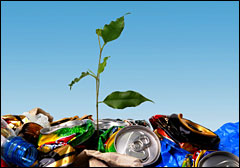Dearest Umbra,
With biodegradable corn-plastic products like clothes hangers, credit cards, and trash bags, we are led to believe there are good alternatives to plastic that can be thrown out guilt-free. But doesn’t all trash get put in landfills that are then hermetically sealed to prevent the bad contaminants from leaching out, but hold in the things that would have been composting otherwise? I thought that was the reason to compost organic matter: to reduce anaerobic digestion in a landfill that causes methane production. So what’s the deal with alternative plastics? Is it a scam? Should it be put out with the food scraps? Help!
Andy Goodell
Oneonta, N.Y.
Dearest Andy,
If you wish to stick a corn-based coat hanger in the worm bin, or bury it, I will eagerly await the results of your experiment. A little niggling on the rest of your question: some trash is incinerated, which comes with its own problems. And there are several reasons to compost organic matter — yours being one, others including making high-quality soil amendments, reducing municipal or personal waste costs, decreasing incinerated matter, or just plain having fun.

How green is your garbage?
Photo: iStockphoto
The subject line of your question asked, “What does biodegradable really mean?” Degradation is simply breaking down into component parts, with chemical transformation in the process, perhaps. Biodegradation implies that degradation takes place within nature, and as you mention, in a landfill process the elements of nature that would degrade your corn-based coat hanger — air, water, aerobic microbes, to name a few — are not particularly present. Hence, alternative plastics may or may not be biodegradable to the extent that you imagine.
There are a few standards for biodegradability to which a producer might adhere, but little oversight for those using the word. The Federal Trade Commission is in charge of deceptive advertising claims, and has put out some general guidelines for all environmental claims on products. They would like it if the word biodegradable were used only to “mean that the materials will break down and return to nature within a reasonably short time after customary disposal. What a ‘reasonably short time’ is depends on where the product is disposed.”
The FTC also cautions consumers to critically read all eco-labeling claims, which is great advice and will help clarify your imaginings. If a producer has a substantiated claim about the low impact of its product, it should be able to give details. You might imagine, for example, when you see the “biodegradable” claim, that the product will biodegrade at your landfill. “Biodegradable in landfills” would be an example of a clarifying label.
Another standard of biodegradability is the voluntary testing guidelines set by the standards organization ASTM International. They have guidelines for degradation in composting operations, in water, in anaerobic conditions, and I’m sure many others. Unless the producer specifies they have used the ASTM standards, you would need to inquire to find out.
Usually the only way to know the true biodegradability of a product is to call the producer and ask: If I put my corn-based coat hanger in the landfill, how long will it take to degrade? Hopefully they will be honest. The coat hanger may not degrade naturally, but perhaps it would if run through an industrial composting process replete with chipping and high temperatures.
As to your final question, are alternative plastics a scam, I think an argument could be made that they are. But the argument would be built on the incomplete knowledge of consumers and the uninformed assumptions we make about alternative plastics.
If we don’t have all the information — and how could we, really — we tend to fill in the gaps with our wishful thinking. Knowing plastics are a trash problem, we wish that someone would replace them with a trash solution. Knowing that petroleum is bad, we hope that corn is good. In one example of reality, plastics with non-petroleum ingredients, such as corn plastics, may also include petroleum-sourced components. It also of course takes quite a bit of petroleum to grow and process corn into coat hangers. Replacing petro-plastic products with bio-plastic products retains some of the same problems of trash generation, disposal, and non-degradation, and adds some odd ones such as potential pollution of recyclable plastics with currently non-recyclable corn plastics.
But I’m not sure the scam argument could hold water if our only claim is being led astray by our own wishful thinking.
Fairly,
Umbra

